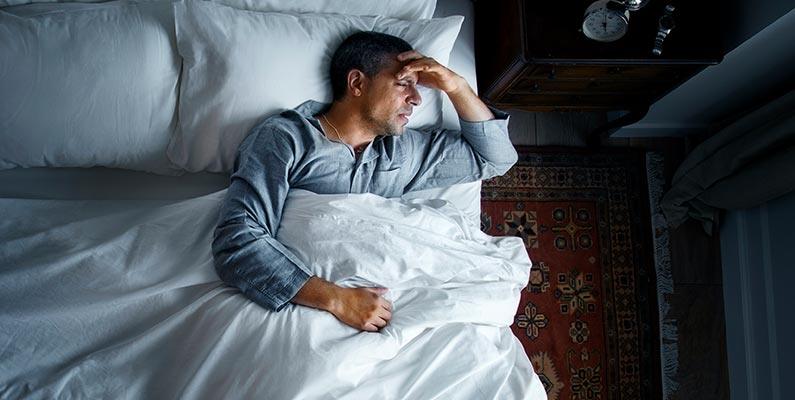Sleep Articles
Recent
Popular
Not sleeping well can have a huge impact on our ability to function at peak performance and our general state of mind. Insomnia can enormously degrade a person’s quality of life. While medication can certainly knock a person out, this also means only treating the surface problem without taking care of the root causes of insomnia. Insomnia affects a large number of people. It can be the result of poor habits, issues which are bothering you, or even the environment you sleep in. Talking to a sleep therapist can help you to identify what is keeping you from getting valuable rest, as discussed in more detail in the articles below.
More Sleep articles
Explore more on Sleep
Medically reviewed by Melissa Guarnaccia, LCSW
Sleep can be defined as a natural and essential state that the body goes into to reset and recharge. When you’re asleep, your state of consciousness is typically altered, and your senses are usually processed in a different way. There are normally five unique sleep cycles the brain goes through during sleep, each lasting approximately 90 minutes and repeating throughout the time you are asleep. With each cycle, you may fall into a deeper sleep. There are also two basic modes of sleep: REM (Rapid Eye Movement) sleep and non-REM sleep. Because sleep can be a crucial aspect of health, it is often important to be familiar with how it works, what it does, and what to do when you’re having problems with it. A therapist can help you address sleep difficulties like insomnia and racing thoughts at night.
Sleep and restoration
Sleep is usually a time when your physical body gets a chance to heal. During this period, your body can shut down and take inventory of what needs restoration. Most notably, your immune system may be restored, your muscular systems may heal and strengthen, and your brain may process any information that was stored away during your waking hours. Not getting enough sleep can affect this process and cause challenges with mood, memory, and physical and mental health. Most people find that they function best when they’re getting adequate, high-quality rest regularly.
Circadian rhythms
Circadian rhythms are often defined as natural 24-hour cycles that involve several physical, mental, and behavioral changes. During each cycle, different signals are usually sent to tell the body when to sleep and when to wake up.
These signals can be affected by light when the sun rises in the morning, as well as the lack of light created when the sun goes down. The circadian rhythm is typically also responsible for other processes, such as hormone release, digestion, body temperature, and more. Animals, fungi, and even cyanobacteria may go through this physiological process.
Your circadian rhythm is generally not stagnant, and it tends to change as you get older. You may find that you need to go to bed earlier as you age or that you need more sleep. However, everyone's circadian rhythms can differ, and if you have a sleep disorder, your circadian rhythm may be off.
Developing healthy sleep habits
Sleep usually has a regenerative property, helping both our minds and our bodies. Therefore, it can be important not to underestimate the importance of rest. Developing healthy sleep habits from a young age can ensure that they’re carried into adulthood.
When you’re young, it might seem as if you can live on three or four hours of sleep. You may even continue to believe this as you grow older. While it’s true that you may be able to function on that amount of sleep, for the average adult, achieving optimal health typically requires getting seven to nine hours of rest per night.
Giving your body the chance to rest and reset itself can ensure that you’re functioning well throughout the day. When you get enough sleep, you can think more clearly and make wise, rational decisions. If you don’t get enough sleep, you may become irritable. Lack of sleep can also cause or contribute to depression, anxiety, and other mental and physical health conditions.

Tips for getting better sleep
If you’re looking for ways to improve your sleep, consider keeping the following tips in mind:
- Two hours before bedtime, stop using electronics, including your phone, television, and computer.
- Use your bed only for sleeping and sex.
- Exercise regularly and maintain healthy eating habits.
- Ensure that your bedroom is dark and quiet.
- Keep your bedroom at a comfortable temperature.
- If you haven’t fallen asleep after 30 minutes of trying, get out of bed and participate in a low-level activity. Some people find that reading helps them fall asleep.
Addressing sleep problems
Sleep can be an essential part of our lives, so if you’re having problems sleeping, it can be critical to troubleshoot and understand what’s going on. One place to start can be with a visit to your doctor. At the appointment, you can explain your symptoms, and your doctor can assess whether a physical or mental health condition could be at play.
It might also be helpful to talk to a mental health professional if you believe your concerns could be stemming from stress, depression, anxiety, or another mental health concern.

Improving your sleep quality with therapy
Sometimes, sleep difficulties may be due to an underlying cause, such as a mental health disorder. Talking to a professional about your symptoms may help you figure out what’s preventing you from getting adequate rest and enable you to adopt new habits to get the sleep you need.
Benefits of online therapy
Because sleep difficulties tend to be more likely to occur at night, you may benefit from speaking with a therapist who operates outside of normal business hours. Online therapy platforms like BetterHelp typically allow you to schedule sessions with a therapist through phone calls, video conferences, or online chat at anytime from anywhere. This resource may be what you need to understand your symptoms and overcome them, all from the comfort of your home.
Effectiveness of online therapy
Stress can be a common contributor to sleep concerns, such as insomnia or daytime fatigue. Research has found that stress management techniques can be learned both in person and online. In one study, researchers discovered that a six-week internet-based stress management program generally improved participants’ sleep quality, coping skills, and levels of emotional exhaustion.
Takeaway
Getting enough high-quality sleep can be crucial to your well-being, both physically and mentally. If you’re struggling to fall asleep, stay asleep, or feel rested after a full night of rest, it could be a sign of a more serious health concern. Many of the articles in this section address challenges relating to sleep, which may be useful in some instances. However, if you’re persistently experiencing sleep difficulties, speaking to a doctor or licensed mental health professional could be beneficial. You can connect with an online therapist through the BetterHelp platform at a time that suits your schedule and needs.


